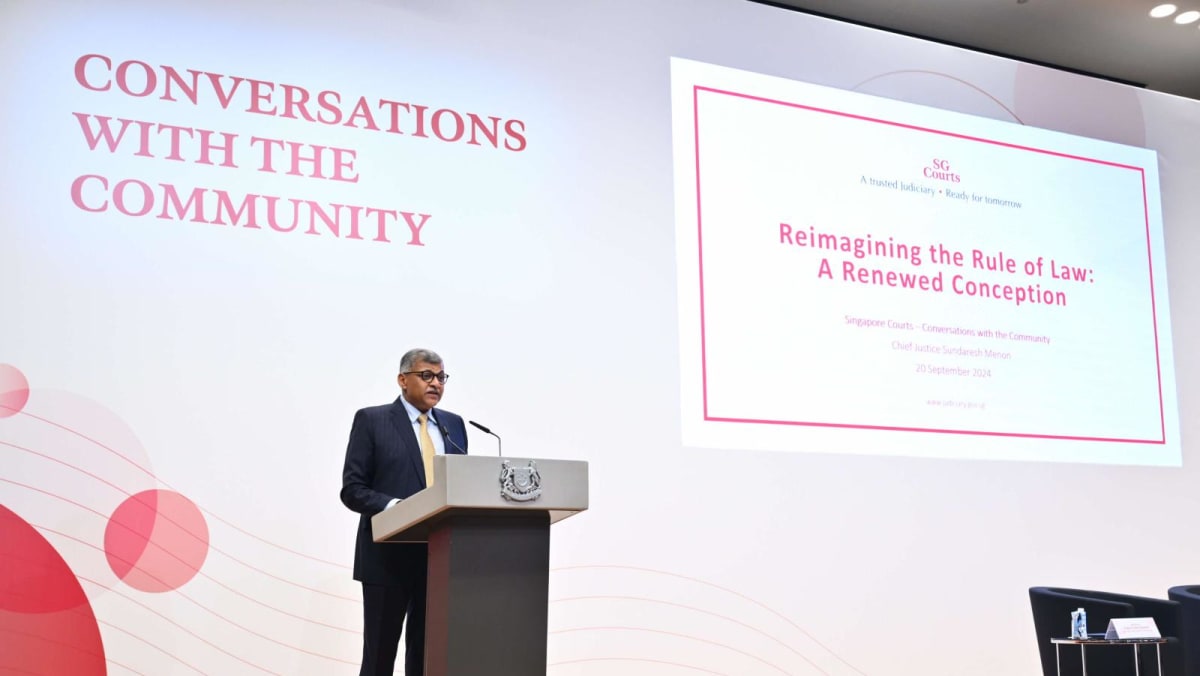SINGAPORE: In the last instalment of a series of conversations organised by the Singapore Courts and local universities to engage the community, the Chief Justice touched on the challenges faced by those in legal practice, including the issue of young lawyers leaving the profession.
In a survey recently conducted among applicants of this year’s mass call, where lawyers are called to the bar en masse, around two-thirds of the 234 respondents said they were likely to move out of legal practice in the next five years.
Slightly more than a third said they were likely to leave the legal profession altogether, Chief Justice Sundaresh Menon revealed on Friday (Sep 20).
He delivered these remarks in a speech marking the end of the SG Courts Conversations with the Community series, a joint effort by the Singapore Courts and the law faculties of the National University of Singapore, Singapore Management University and the Singapore University of Social Sciences.
More than 1,100 people – judges, lawyers, students, educators, public officers and specialists – have participated in the conversations since they began a year ago.
In his speech, the Chief Justice said the survey results are concerning not only because they represent the views of those just starting out in legal careers, but also because most of these responses appeared to be motivated by “push” rather than “pull” factors.
“In particular, a significant proportion of respondents indicated that their present inclination to leave was influenced by excessive workload or poor work-life balance, and poor workplace culture,” said Chief Justice Menon.
He said this issue should be looked into “urgently”, with a close watch kept on sustainable practices in “each of our workplaces”.
He suggested three broad components to be worked on: First, considering if there is an issue of mismatched expectations in the legal profession, and a generation gap that needs to be addressed urgently.
“On the part of junior lawyers, it may need to be emphasised to them that a career in the law demands a considerable amount of hard work over the long haul, and especially in the formative years where there is undoubtedly a steep learning curve,” he said.
However, he added that senior lawyers need to be conveyed a message that workplace practices have evolved over the years, and there has “rightly been a shift” towards more sustainable and mindful practices which the profession as a whole should embrace.
He said there must be mutual trust between law firms and their employees, with due regard for the “wellbeing of our junior colleagues coupled with the recognition that this need not impede effective performance”.
The second component is the development of concrete policies to ensure the implementation of sustainable workplace practices.
The Ethics and Professional Standards Committee is set to release its final recommendations in due course, said the Chief Justice.
The committee was established after a rise in disciplinary cases against lawyers, with the number of disciplinary violations going up from 2018 to 2022.
The last component is on how to “more effectively communicate and instil the values that are foundational to our practice of law”, which should be the main reason why lawyers enter the profession.
The Chief Justice also spoke about access to justice – a long-standing challenge that has become more urgent with a “significant” component of court users now self-represented.
“In this ‘new normal’, we must ensure that all parties, and especially self-represented persons, have a realistic opportunity to commence or defend a claim, and a fair shot at presenting their case, regardless of their resources or legal literacy,” said Chief Justice Menon.
“Our justice system must not become the exclusive preserve of a select few, because the sustainability of the legal process rests on a shared societal commitment to the rule of law, and this in turn requires the public to trust that the courts will deliver justice for all and especially for those most in need.”
Changes have already been made at the structural level, by simplifying procedural frameworks for certain types of cases.
Two months ago, the High Court launched an Express Track scheme to facilitate the swift resolution of some civil matters that can be resolved within four days of trial.
The Chief Justice ended his speech noting that the courts’ responses to the challenges faced will “have a direct impact on the level of trust and confidence in our courts, the courts’ legitimacy, and therefore the continued relevance of the rule of law to future generations of Singaporeans”.
In response to queries from CNA, a spokesperson for the judiciary said feedback received from the more than 1,100 participants in the conversations has been “encouraging”.
“The SG Courts will continue to reach out to the community through such programmes and other platforms, such as our social media channels,” she said.
